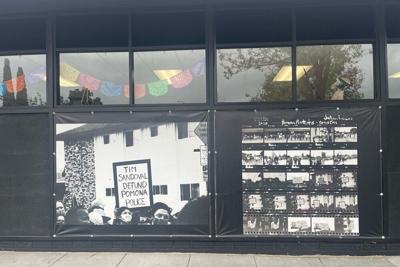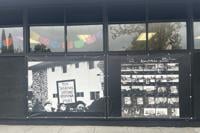
The lawsuit over the constitutional rights of Gente Organizada to display artwork like this at its Pomona youth center has been settled.
The city of Pomona and a community nonprofit group have settled a lawsuit alleging the group’s youth center was unconstitutionally cited for displaying exterior artwork depicting protests against alleged policing excesses.
The group Gente Organizada (a Spanish term meaning “Organized People”) filed a lawsuit against the city in 2023 that challenged the constitutionality of Pomona’s sign code after the youth center was given two citations indicating zoning violations due to the content of artwork placed on the facade of the building. The ACLU of Southern California represented Gente Organizada during the course of the litigation.
Under the terms of the settlement, which was announced on July 14, the city will rescind the citations and reimburse the community group a sum of $394, the amount Gente Organizada paid the city in fines. In addition, the city had 45 days from the execution of the agreement back in May to reimburse the community group for $150,000 in attorney’s fees and costs.
The city cited artwork that simulated a roll of film with photos of protests against police use of force and “biased policing,” according to the ACLU of Southern California. Another cited image was a depiction of the group’s supporters alongside a sign urging, “End institutional violence.”
In turn, Gente Organizada has agreed to seek the dismissal of its lawsuit with prejudice.
The settlement calls for the city to revise its Public Art Code and to allow the community group and its counsel to offer input on the final revisions before they are presented to the City Council. In addition, Gente Organizada will be able to display new artwork on its facade without the need to obtain a new permit for the next five years.
“We are pleased that the city shifted from its initial citations against Gente and instead worked with us to develop a revised sign code that respects constitutional rights," Jonathan Markovitz, staff attorney with the ACLU of Southern California, said in a prepared statement. "We hope this case inspires other cities to honor fundamental rights to free speech and expression when considering their own zoning and sign codes.”
Pomona officials did not respond to requests for comment about the settlement.
Ivan Hernandez, a Gente Organizada director, said the city had weaponized the city code to limit the group’s right to self-expression, but he expressed satisfaction with the eventual outcome.
“... We are grateful this litigation resulted in changes in the city code that uphold our constitutional rights – ensuring that other Pomona organizations are not unfairly subjected to improper citations and fines,” Hernandez said in a statement.
The settlement also required the city to send thank-you letters to the plaintiff’s counsel – the ACLU and Sheppard, Mullin, Richter & Hampton LLP – for their assistance in addressing the constitutional objections to the previous iteration of the code.
“Murals, signs and banners are classic venues for free speech and self-expression of all kinds,” Andrea Feathers of Sheppard, Mullin, Richter & Hampton said. “The settlement of this litigation ensures that the public will no longer be subjected to the unconstitutional restrictions that the prior sign code imposed on members of the public who want to choose to exercise their free-speech rights in this medium.”






